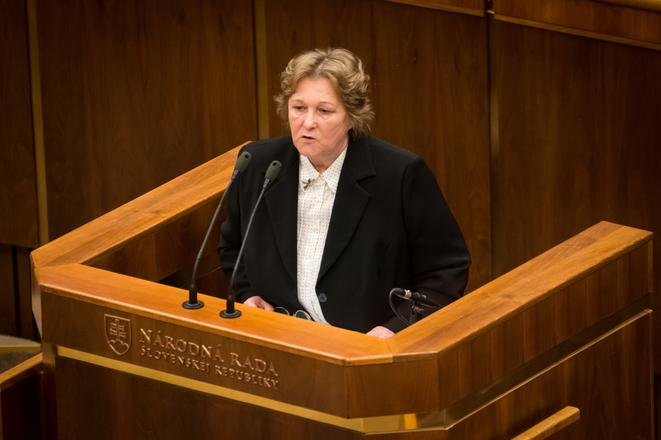A lawyer, a psychologist and a civic activist – one of them may replace current Ombudswoman Jana Dubovcová whose term as the public defender of rights officially expires in late March.
“It should be a person who systematically deals with the human rights agenda, isn’t member of a political party and has experiences and results [from work in the field],” Grigorij Mesežnikov, president of the non-governmental Institute for Public Affairs, told The Slovak Spectator when describing the qualities of a new ombudsperson.
The parliament has already confirmed three candidates for the post. The ruling coalition nominated Mária Patakyová, a vice-rector of Comenius University in Bratislava responsible for legislation, while the opposition parties proposed activist and former MP Janka Šípošová. The last candidate is activist and teacher Anton Čulen, nominated by far-right People’s Party – Our Slovakia (ĽSNS) and non-affiliated MP Peter Marček.
The deputies will elect a new public defender of rights for the next five years on February 8, two days after they are heard by the parliamentary human rights committee. A successful candidate needs to obtain at least 76 votesa majority of votes.

An unsuccessful EU court candidate
Of the three candidates, Patakyová has the biggest chances to win as she is the joint candidate of the ruling coalition, Mesežnikov opines.
“She is a recognised expert and authority in the legal sphere in Slovakia and also abroad,” said Gábor Gál, MP for the Most-Híd party which nominated her, as quoted by the TASR newswire.
Though Patakyová primarily focuses on commercial and financial law, Gál does not consider it a problem, saying she has also been dealing with the human rights agenda. He stressed she is not only an expert, but also a non-partisan candidate, as reported by TASR.
“I appreciate the offer of Most-Híd,” Patakyová told The Slovak Spectator, adding that after assessing the requirements for the post she decided to accept it.
Yet she refused to provide more comments, saying she will present her vision at the session of the human rights committee.
Patakyová is also known as an unsuccessful candidate for a judicial post at the EU General Court. She failed to land the post due to her lack of French.
No support to a whistleblower
Though Patakyová has been dealing with the human rights agenda and the coalition parties highlight her qualities, she has already failed to support a whistleblower.
When Zuzana Melicherčíková reported about apparently murky practices in the admission of students to the university’s Law Faculty in 2010, which resulted in her losing her job, Patakyová did not help, the Sme daily reported on January 30. Patakyová has refused to comment on the incident.
Most-Híd, however, does not see any problem with her behaviour, saying she was responsible for a different agenda at the time. The admission of students was the responsibility of then vice-rector of Comenius University Ján Pekár, the party’s spokesperson Klára Debnár told Sme.
Mesežnikov, however, opines she could have at least taken a stand in the case.
“She has not commented on the issue at all,” the analyst said, adding that it was a widely covered case and Melicherčíková was even awarded a White Crow award, granted to whistleblowers by the ethics watchdog Fair-Play Alliance.
Moreover, Patakyová has not even expressed her opinion on any other problems or scandals concerning human rights that have emerged over the past 10 years, though several personalities, even from academia, have done so, he said.
“I have a feeling that there are many more good candidates for the ombudsman post with proven experience, results, passion and dedication to human rights protection,” Mesežnikov added.
An activist, but also an ex-MP
Šípošová, a joint candidate of the Ordinary People and Independent Personalities (OĽaNO-NOVA) and Freedom and Solidarity (SaS), is described as an experienced expert and activist in the human rights field. She, among other things, founded the first advisory centre for crime and violence victims in Bratislava, and then the nation-wide network called Victims of Violence Support.
The opposition parties hope that under her leadership the whole ombudsperson's office will maintain its independence and professionalism that it received under Dubovcová, according to a statement provided to The Slovak Spectator.
“I really appreciate the offer,” Šípošová told The Slovak Spectator. She hopes that her work in the field will persuade the MPs that she is an appropriate candidate for the post.
Šípošová also served as an MP for OĽaNO in 2014-2016, and now works as an advisor to OĽaNO-NOVA’s Erika Jurinová.
She, however, does not consider her career in the parliament a problem. She made it to the parliament as an independent expert and says she has always remained true to her values and opinions.
Political allegiance a problem?
One of the conditions set by the law is that the public defender of rights should not be member of any political party or movement. This is also the reason why the ruling coalition supports Patakyová who, according to Prime Minister Robert Fico, is not burdened with her previous career in politics.
“In the case of this candidate we can say she will be absolutely impartial, which is a difference compared with the current ombudswoman who acted as an MP,” Fico said, as quoted by TASR.
He referred to the fact that Dubovcová was an MP for the Slovak Democratic and Christian Union (SDKÚ) since 2010. She, however, has not been a member of the party and left the parliament after she had been elected ombudswoman in December 2011.
Mesežnikov says that Dubovcová has not represented the interests of any party when acting as ombudswoman. Though she often clashed with the representatives of the second Fico government, it was not due to her political career, but rather her opinions on human rights protection that differed from the ones presented by the ruling party, the analyst opines.
“I can imagine that if there was someone with similar values as Dubovcová in the post, he/she would also have conflicts with Fico and his government,” Mesežnikov added.
Michaela Terenzani contributed to this report



 Ombudswoman Jana Dubovcová (source: SITA)
Ombudswoman Jana Dubovcová (source: SITA)